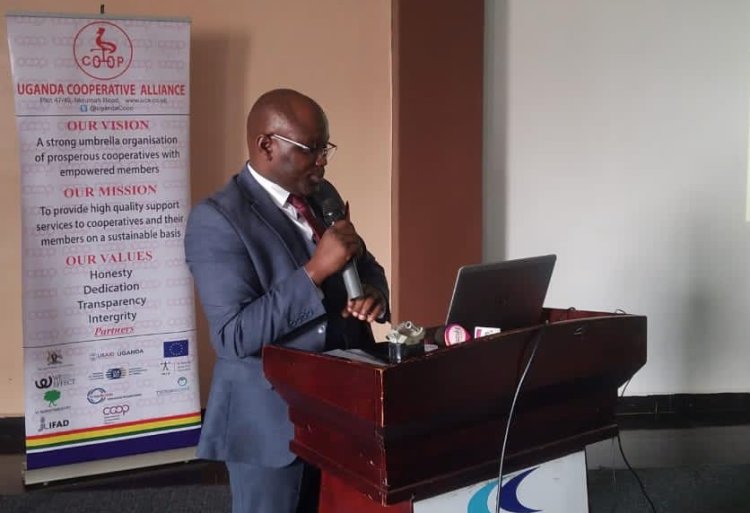Uganda Cooperative Alliance call upon government’s positive involvement in order to fast track progress

KAMPALA - Section 29 of the Cooperative Society Act stipulates; the Board of Uganda Cooperative Alliance Ltd (UCA) should engage government on policy matters related to all cooperatives in the country, whereas Section 73 gives UCA the legal mandate to resolve disputes.
It is from the above background that Mr. Ivan Asiimwe, the Secretary General of the Uganda Cooperative Alliance, an apex body for cooperatives in the country, appeals to government to formulate one law to govern them when it comes to regulation. The Secretary General also called upon Cooperatives especially SACCOs to be strategic, plan well, make sound decisions and innovations if the institution (UCA) in order to sustain its giant position in Uganda’s SACCO industry.
He made the remarks during a stakeholders meeting on Co-operative policy on Legal framework and the role of UCA Apex on Tuesday 29th November 2022 at Silver Springs hotel in Kampala.
He also encouraged leadership of SACCOs to pay special attention to emerging risks and devise ways to mitigate such risks, urging them to invest in other income earning ventures without deviating from the vision, mission and objectives of the respective SACCOs.
According to Mr. Asiimwe, the main driver of growth in SACCOs is capacity building through training, drafting of good policies to guide operations as well as effective lobby and advocacy. He referred to the recent tax waiver, among others, as fruits of effective advocacy by UCA and UCSCU.
However, in his response, Hon. Fredick Ngobi Gume, the Minister of State for Cooperatives has tasked leaders of Uganda Cooperative Alliance with developing a law that safeguards the properties of the cooperation.
Gume says the law will protect the cooperatives from losing their properties, as was the case in the past when the cooperative industry collapsed.
This as the government moves to revamp cooperatives through ongoing rationalization. A Stakeholders Platform to champion Cooperative issues in Uganda and Development of a road map for fast Tracking Cooperative progress and performance indicators was put in place after the stakeholders meeting.
Meanwhile, John Robert Okware, Country Representative ACELI AFRICA says they will bridge the financial gap and unlock the growth and impact potential of agricultural Small, Medium Enterprises in Africa particularly Uganda. ACELI AFRICA are one of the so many partners of Uganda Cooperative Alliance having facilitated their Secretary General Mr. Ivan Asiimwe for a high-level training on cooperatives which knowledge he has already disseminated to the members of UCA.
According to Mr Ferdinand Tumuhaise a lawyer with Kampala Associated Advocates, Co-operative Unions and Saving and Credit Co-operatives (SACCOs) across the country need one law and also urged government to formulate it in to govern them when it comes to regulation. The controversy over regulation arises because they are torn between Ministry of Trade that licenses them through registrar, Bank of Uganda and Uganda Microfinance Regulatory Authority over matters of regulation. According to him, government through Parliament should come up with a good law that is harmonized and sets the criteria clear on who has the mandate to regulate such organizations.
Mr Tumuhaise said the current law is ambiguous as members of co-operative unions and SACCOs struggle to understand it. He cited a situation where one is registered by registrar of co-operatives and SACCOs then sent to Bank of Uganda for registration to be regulated yet they are supposed to be regulated by Uganda Microfinance Regulatory Authority which brings about confusion.
In Uganda, Savings and Credit Co-operatives (SACCOs) have for a long time been part of the Cooperative movement and regulated under the Ministry of Trade and Cooperatives. However, in 2016 parliament enacted a law that required licensing of SACCOs under the Ministry of Finance but no regulations were made to operationalize the Act till 4 years later. In 2020, Parliament further amended the law governing cooperatives which essentially brought back the supervision of SACCOs to the Ministry of Trade and Cooperatives thereby creating a confusing legal framework that is hard to implement practically.
Savings and Credit Co-operatives (SACCOs) are community membership-based financial institutions that are formed and owned by their members in promotion of their economic interests. SACCOs are for promoting and mobilizing savings and extending credit and financial services to their members. Unlike other cooperatives which are formed for social or cultural purposes, SACCOs are specifically formed to extend financial services to their members.
In Uganda, SACCOs were introduced through the Uganda Cooperative Alliance Ltd (UCA) as a response to the 1990’s government policy of scaling down on its participation in the cooperative movement. SACCOs were formed to work as conduits for agricultural credit and as a result, many SACCOs were formed to access that money. The rise of SACCOs was basically meant to fill the financing vacuum created by the collapse of the credit facilities which were embedded in the cooperative network. The main purpose of the SACCOs was to provide financial services based on self-reliance that is to say being able to mobilize and manage their financial activities.
Until 2016, SACCO’s were registered and regulated like other Cooperatives under Cap. 112 and restricted transactions with non-members. Cap. 112 restricted provision of loans to only members and required consent of Registrar in case of non-members. The Act allowed receiving of deposits and loans from persons who are non-members under the authority of the Registrar.
There was an upsurge of SACCOs in the country which accumulated a lot of money in terms of savings. At some point, the government did not know how many SACCOs were in the country.
In 2016, the government moved to regulate SACCOs depending on their size. Parliament enacted Tier 4 Microfinance and Money Lenders Act, 2016 which provided for the licensing of small SACCOs (; below Ugx.1.5 billion in savings and Ugx.500 million institutional capital). The Small SACCO’s were to be licensed by Uganda Micro Finance Regulatory Authority (UMRA). Large SACCO’s (Voluntary savings exceeding Ugx.1.5 billion and institutional capital of Ugx.500 million) were to be licensed by the Central Bank.
In 2016, SACCOs were now regulated under 3 laws as follows;
• The Cooperative Societies Act Cap 11 was only for registering the society.
• Once registered, the society which intended to carry out financial services had to apply for a license to the Uganda Micro-Finance Regulatory Authority (UMRA) as stipulated under the Tier 4 Microfinance and Money Lenders Act, 2016.
• However, if a SACCO’s voluntary savings were in excess of one billion five hundred million Ugandan shillings, or its institutional capital was above five hundred million shillings, such a SACCO is required to obtain a license from Bank of Uganda under the Micro Finance Deposit Taking Institutions of 2003.
Once a SACCO obtained a license, the Registrar no longer had powers over it and any exercise of such power was vested in UMRA. Conflict of laws;
The Co-operative Societies (Amendment) Bill of 2016 was debated and passed by Parliament in May 2019. The Bill was assented to by the President in January 2020 and subsequently gazetted on 20th March 2020 which marked its commencement date.
The amendment provided for the registration and supervision of SACCOS by the Registrar but this was done without causing any amendments in the Tier 4 Microfinance and Money Lenders Act, 2016 Act. This resulted in the conflict of laws governing SACCOS.
The conflict in the law can be seen at registration, supervision and liquidation of SACCOS. Whereas Tier 4 Act prohibits use of the name SACCO unless a society is licensed, the 2020 Amendment of Cap 112 provides the words “SACCO shall form part of the name of a society formed at the time of registration. The implication of Section 55A is that a society can be registered direct from inception by adopting the name SACCO but without a license to grant it such a status.
Further, Tier 4 Act provides that no other person can liquidate a SACCO other than UMRA and provides for takeover of an unsound SACCO by UMRA. However, under the amendment, the Registrar has power to place a SACCO considered unviable into involuntary liquidation One wonders in such a case, who shall take over management of the SACCO, UMRA or the Registrar?
Therefore, the net effect of the amendment is that currently SACCOs are registered, developed, supervised, deregistered and liquidated by the Registrar of Cooperatives. At the same time SACCOs are licensed, regulated and supervised by the Ministry of Finance either under UMRA or Bank of Uganda.
It should be noted that even though UMRA and Bank of Uganda were given power in 2016 to license SACCOS, no regulations were enacted to operationalize the Act. Later, UMRA enacted regulations which were, interestingly, gazetted on the same day as the 2020 Amendment (30th March 2020) meaning that both the 2020 Amendment and the Regulations by UMRA commenced on the same day. UMRA further went ahead and issued guidelines for licensing of SACCOs.
Principles of statutory interpretation.
There are two principles of statutory interpretation applicable to this situation. The first one is that; Where the provisions of a particular Act of Parliament dealing with a particular subject matter are wholly inconsistent with the provisions of an earlier Act dealing with the same subject matter, then the earlier Act is repealed by implication.
This would mean that the 2020 Amendment has repealed the Tier 4 Microfinance and Money Lenders Act, 2016 Act by necessary implication. The second principle is; where there is a conflict between a general and specific Act, the earlier Act is not considered indirectly repealed, altered or derogated from by use of general words in a later enactment.
Almost all of the provisions on SACCOs in the Tier 4 Microfinance and Money Lenders Act, 2016 have been replicated in the amendment with necessary modifications. One of the Objects of the Bill was to ensure that all types of Cooperatives are supervised by the Registrar and brought under the Ministry of Trade.
The only provisions in Tier 4 Microfinance and Money Lenders Act, 2016 which are not replicated in the amendment are those relating to licensing, takeover, shareholding, a Reserve Fund, the SACCO Stabilisation Fund, Central Financing Facility and minimum capital requirements. On the other hand, the amendment establishes an Asset and Liability Management Committee which is mandated among others to determine minimum capital requirements. The 2020 Amendment has further included corporative governance, dispute resolution, Credit Reference Bureau, the credit committee, dormant accounts, interest and other charges on loan, investment of society funds, the cooperative central finance fund, involuntary liquidation, and dispute resolution in savings and credit cooperative societies which are not in the Tier 4 Microfinance and Money Lenders Act, 2016.
The intention of Parliament as can be seen from the Hansard was to bring SACCO’s back to the Ministry of Trade under the supervision of the Registrar. On the other hand, the purpose of licensing SACCOs’ under the Tier 4 Microfinance and Money Lenders Act, 2016 was to provide for licensing and management of tier 4 microfinance institutions which include SACCOs. However, the amendment now specifically states that SACCOs shall be formed to provide financial services and shall adopt the name savings and credit co-operative societies.
Since the purpose of licensing is to be allowed to use the name SACCO, it would imply that there is no need to obtain a license from UMRA since now a SACCO can be registered purposely to offer financial services and use the name SACCO, yet this is what Tier 4 Microfinance and Money Lenders Act, 2016 prohibits in absence of a license from UMRA. This clearly repeals by necessary implication any provision relating to SACCO’s under the Tier 4 Microfinance and Money Lenders Act, 2016.

































































































